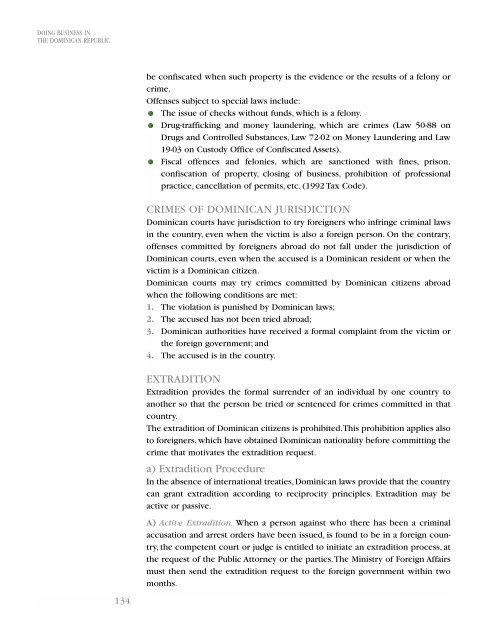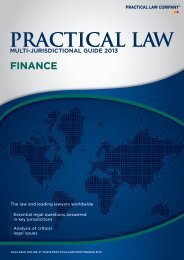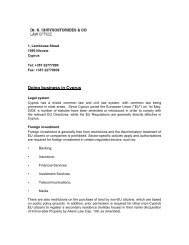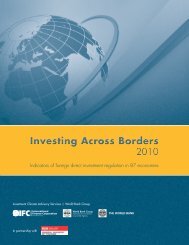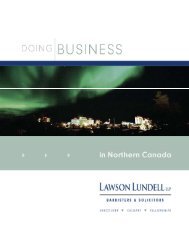do business in the Dominican Republic - Pellerano & Herrera
do business in the Dominican Republic - Pellerano & Herrera
do business in the Dominican Republic - Pellerano & Herrera
- No tags were found...
You also want an ePaper? Increase the reach of your titles
YUMPU automatically turns print PDFs into web optimized ePapers that Google loves.
DOING BUSINESS INTHE DOMINICAN REPUBLICbe confiscated when such property is <strong>the</strong> evidence or <strong>the</strong> results of a felony orcrime.Offenses subject to special laws <strong>in</strong>clude:The issue of checks without funds, which is a felony.Drug-traffick<strong>in</strong>g and money launder<strong>in</strong>g, which are crimes (Law 50-88 onDrugs and Controlled Substances, Law 72-02 on Money Launder<strong>in</strong>g and Law19-03 on Custody Office of Confiscated Assets).Fiscal offences and felonies, which are sanctioned with f<strong>in</strong>es, prison,confiscation of property, clos<strong>in</strong>g of <strong>bus<strong>in</strong>ess</strong>, prohibition of professionalpractice, cancellation of permits, etc. (1992 Tax Code).CRIMES OF DOMINICAN JURISDICTIONDom<strong>in</strong>ican courts have jurisdiction to try foreigners who <strong>in</strong>fr<strong>in</strong>ge crim<strong>in</strong>al laws<strong>in</strong> <strong>the</strong> country, even when <strong>the</strong> victim is also a foreign person. On <strong>the</strong> contrary,offenses committed by foreigners abroad <strong>do</strong> not fall under <strong>the</strong> jurisdiction ofDom<strong>in</strong>ican courts, even when <strong>the</strong> accused is a Dom<strong>in</strong>ican resident or when <strong>the</strong>victim is a Dom<strong>in</strong>ican citizen.Dom<strong>in</strong>ican courts may try crimes committed by Dom<strong>in</strong>ican citizens abroadwhen <strong>the</strong> follow<strong>in</strong>g conditions are met:1. The violation is punished by Dom<strong>in</strong>ican laws;2. The accused has not been tried abroad;3. Dom<strong>in</strong>ican authorities have received a formal compla<strong>in</strong>t from <strong>the</strong> victim or<strong>the</strong> foreign government; and4. The accused is <strong>in</strong> <strong>the</strong> country.134EXTRADITIONExtradition provides <strong>the</strong> formal surrender of an <strong>in</strong>dividual by one country toano<strong>the</strong>r so that <strong>the</strong> person be tried or sentenced for crimes committed <strong>in</strong> thatcountry.The extradition of Dom<strong>in</strong>ican citizens is prohibited.This prohibition applies alsoto foreigners, which have obta<strong>in</strong>ed Dom<strong>in</strong>ican nationality before committ<strong>in</strong>g <strong>the</strong>crime that motivates <strong>the</strong> extradition request.a) Extradition ProcedureIn <strong>the</strong> absence of <strong>in</strong>ternational treaties, Dom<strong>in</strong>ican laws provide that <strong>the</strong> countrycan grant extradition accord<strong>in</strong>g to reciprocity pr<strong>in</strong>ciples. Extradition may beactive or passive.A) Active Extradition. When a person aga<strong>in</strong>st who <strong>the</strong>re has been a crim<strong>in</strong>alaccusation and arrest orders have been issued, is found to be <strong>in</strong> a foreign country,<strong>the</strong> competent court or judge is entitled to <strong>in</strong>itiate an extradition process, at<strong>the</strong> request of <strong>the</strong> Public Attorney or <strong>the</strong> parties.The M<strong>in</strong>istry of Foreign Affairsmust <strong>the</strong>n send <strong>the</strong> extradition request to <strong>the</strong> foreign government with<strong>in</strong> twomonths.


